INTO THE NEW MILLENNIUM
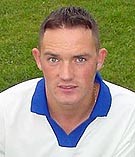
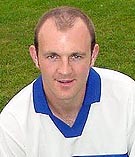
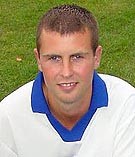
At the start of his first full season in charge of Coleraine, Marty Quinn had high hopes that the second place finish he had managed the previous campaign could be built upon. To do so, he had started to put his own stamp on the squad he had inherited from Kenny Shiels, bringing in striker Jody Tolan from his former club Cliftonville and former Linfield duo Ian McCoosh and Ryan McLaughlin.
That second place finish had earned Coleraine another UEFA Cup qualification and they didn’t disgrace themselves against Swedish side Orgryte IS, only losing 3-1 over the two legs. However, in the Premier League, it took until the sixth game for Coleraine to register their first win but it was worth the wait, a stunning 5-2 success against Glentoran. Former Glens captain John Devine set the ball rolling, then Tolan added two of his own before Dessie Loughery and Kevin Keegan completed the scoring.
A couple of weeks later, McLaughlin scored the only goal as Coleraine ended Linfield’s unbeaten start and while too many draws hindered Coleraine’s pursuit of David Jeffrey’s side in the league, they found themselves on collision course with the Blues in the last four of the Gold Cup.
The first leg of the semi-final started badly for Coleraine when Chris Morgan struck after only two minutes, but McCoosh levelled on his return to Windsor before two second half goals from Loughery put Coleraine in control. A thrilling 3-3 draw in the return saw Coleraine into the final against Glentoran, which turned out to be another epic.
Glentoran were the cup specialists of the era and went in front twice, but Devine and Loughery levelled the scores at 2-2 going into the last half hour. Then disaster struck for Coleraine when goalkeeper Kevin McKeown limped off on 68 minutes and with no replacement keeper on the bench, Pat McAllister was forced to don the gloves. Despite pulling off a couple of fine saves he was beaten twice and, although Tolan pulled one back late on, the last ever Gold Cup final was won by the East Belfast side.
A couple of weeks before that final, Coleraine had an altogether happier visit to Windsor Park when they stunned Linfield with a 3-0 victory. McAllister, Tolan and Loughery were on target in that game, the highlight of a run of four wins in five games which sent Coleraine into the New Year as Linfield’s main title challengers, helped by a number of impressive performances from Ian Martin, McKeown’s young replacement.
Then it all went wrong as a plague of injuries decimated Coleraine’s squad and they only picked up one point in the rest of January, ironically from a draw against Linfield. Nigel Quigley returned to the club where he had made his name, while striker Sean Armstrong signed from Glentoran and netted a last-minute derby winner at Ballymena in only his second appearance. But Coleraine fell away behind Linfield, and were overtaken by Glenavon and Glentoran as well, to end up fourth. Worse fortunes came in the cups as Loughgall provided an unwelcome reminder that lightening sometimes does strike twice, by defeating Coleraine in a penalty shootout in the fifth round. Then a week later in the Coca Cola League Cup, Armagh City repeated the trick.
The disappointing end to the 2000/01 season saw Quinn invest heavily in new players during the summer, bringing in Rory Hamill, Stephen Beatty, Gerry Flynn, Barry Curran and Paul Hegarty. Meanwhile, Loughery had retired while McKeown, Michael Smyth, Marty McCann and Oliver McAuley all moved on.
Coleraine went top at the start of September, but that was followed by four successive defeats. A win over Glentoran on Hamill’s debut, delayed due to his drugs ban imposed while he was a Glens player, improved the mood but the following week, early pacesetters Portadown brought them back down to earth.
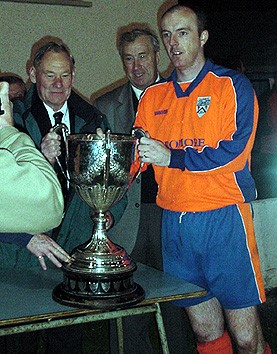
Coleraine continued to pick up points to keep within touching distance of Portadown and Glentoran, but fell in the semi-finals of the CIS League Cup to Linfield, mainly due to a 2-0 first leg defeat inflicted by two Tony Gorman strikes from implausible distances. In January Linfield would again inflict defeat on Quinn’s men, 7-1 at Windsor Park. After such a shellacking it would have been easy for Coleraine to crumble, but astonishingly within four weeks, Coleraine were top of the table following a 1-0 win over Glentoran.
But again a defeat by Portadown brought them down to earth quickly and the league challenge ultimately fizzled out. Ronnie McFall’s team certainly were Coleraine’s bête noire that year as they also inflicted a 2-0 defeat in the Irish Cup semi-finals. The only consolation came in the North West Cup, with a 2-0 win over Omagh Town in September having provided Quinn with his first silverware at The Showgrounds.
The 75th anniversary and the 2003 Irish Cup win
Coleraine had done enough to qualify for the Inter-Toto Cup, which meant the 2002/03 season began at the end of June with a home game against Andorran minnows St Julia. Bolstered by a number of new signings including goalkeeper Davy O’Hare returning for a second spell at the club, Coleraine recorded a 5-0 win, their biggest in European competition meaning the second leg was a formality. In the event it took a late goal from debutant centre back Gareth McAuley to salvage a 2-2 draw. The second round saw French side Troyes as opposition and Coleraine performed well over the two legs, only losing 4-2 on aggregate to the Ligue Un outfit.
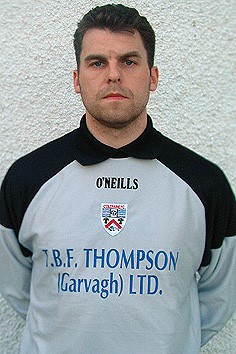
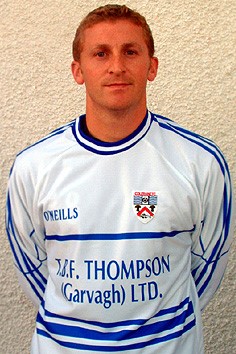
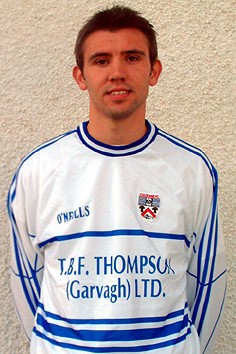
Signings during the summer of 2002, Davy O’Hare, Tony Gorman and Gareth McAuley
Tony Gorman also returned to The Showgrounds during the summer, making his debut at the start of the league campaign in a 3-2 win over Glenavon. As part of the club’s 75th anniversary a new white playing strip was adopted, replacing the hooped designs worn for the previous three campaigns with another classic Coleraine colour scheme, amber and black returning as an away kit. But initially these kits accompanied some rather mixed results and following a defeat to Omagh in the middle of October, Quinn offered his resignation, but was talked out of it by the board. Instead, he brought in former Loughgall and Newry manager Alfie Wylie as his assistant and, starting with a 3-1 win over Institute, gradually the side’s fortunes began to turn around.
Momentum began to build throughout November and December, including an impressive 3-1 win over Linfield but the team sent out a real message of their intent at the start of February with a 5-1 win away to Portadown at Shamrock Park. Stephen Beatty scored twice either side of a Sean Armstrong strike in the first half and Jody Tolan completed the hammering with a brace of his own in the second half as Coleraine simply played the reigning champions off the park.
The unbeaten run eventually extended to 20 games in all competitions, a club record within a single season and, although Wylie left to manage Glenavon, Coleraine continued to push on and finished the league season in third. But the second half of the season was really all about the Irish Cup.
The cup run began with a trip to face Lisburn Distillery at New Grosvenor where goals from Jody Tolan and Michael McHugh saw Coleraine through. Then two goals from Paul Gaston beat First Division Larne in the sixth round and Rory Hamill struck twice to beat Crusaders in the quarter-finals. That set up a semi-final with Roy McCreadie’s Omagh Town at the Ballymena Showgrounds.
Omagh had defeated the Bannsiders three times already that season, but Coleraine started with a flourish and a spectacular long-range strike from Gorman opened the scoring and Barry Curran doubled the lead four minutes later. Omagh pulled one back, but Tolan added a third for Coleraine, only for Omagh to score again before the break. But Coleraine held their nerve after the break and further goals from Gorman and Curran booked their first Irish Cup final appearance for 17 years.
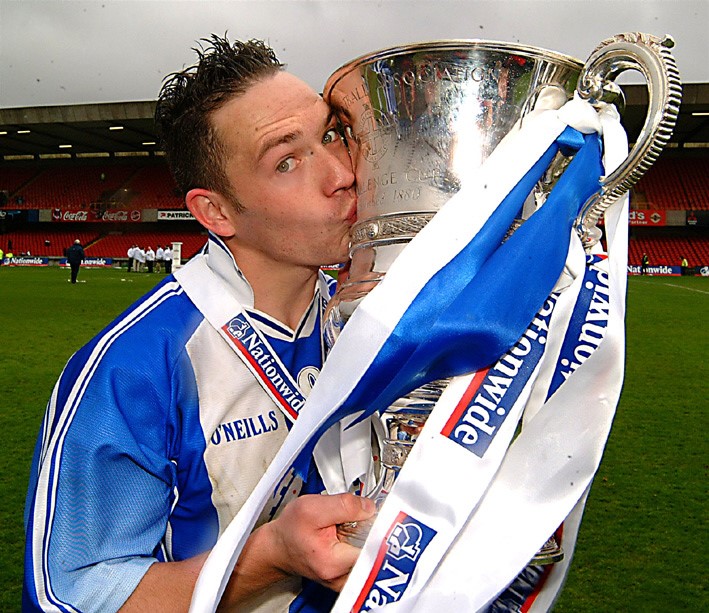
Just as they had been in 1986, Glentoran were the opposition, although this time they were heading into the game looking to complete a clean sweep of all four domestic trophies. A strong finish to the league campaign, including a comeback from 2-0 down to draw against their final opponents two weeks before the showpiece, ensured Coleraine went into the game with confidence and to the delight of the support, they were back in stripes with a new strip being unveiled in the week leading up to the match.
Although massive underdogs when they stepped onto the Windsor Park pitch on May 3, Coleraine made an encouraging start with Gareth McAuley having a goal harshly ruled out. But after 11 minutes they got their reward as following a goalmouth scramble, Tolan poked the ball home to send the large Coleraine support into raptures. It wasn’t a classic final, but Coleraine stuck to their game plan perfectly and frustrated the league champions. Rory Hamill could have doubled the lead after the break, while Glentoran hit the bar twice through Tim McCann, but Coleraine held on to clinch an historic success.
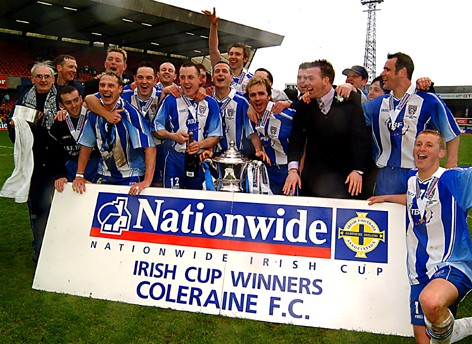
Coleraine’s squad celebrate their victory over Glentoran in the 2003 Irish Cup Final
Changing Times 2003-2005
Filled with confidence after the Irish Cup win, the next step for Coleraine seemed to be a serious title challenge. The Irish League returned to 16 teams for the 2003/04 season and Coleraine, along with the usual suspects Linfield, Glentoran and Portadown, were considered to be the pre-season favourites.
Before the domestic season there was the small matter of another European campaign, with Coleraine causing a shock by defeating Portuguese side UD Leiria 2-1 at The Showgrounds, with goals from Gaston and Hamill. The away leg was a much less pleasant experience with Stewart Clanachan and Stephen Beatty both being harshly sent off as Coleraine wilted in the Portuguese heat, losing 5-0 on the night.
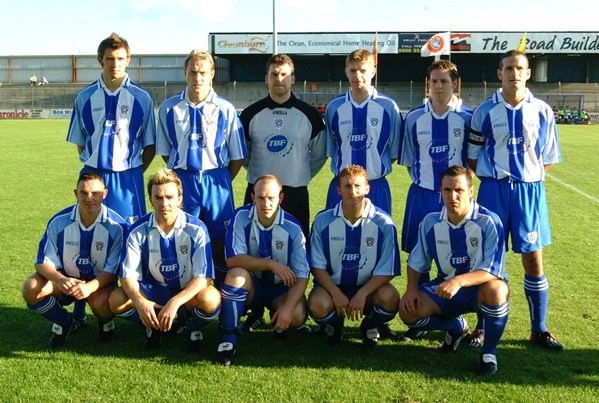
Coleraine line-up before their UEFA Cup tie against U.D. Leiria in August 2003
Coleraine qualified from their CIS Cup group without too many problems, but suffered a shock defeat in the quarter finals against Larne. That came only days after they had started their league campaign with a 2-0 win over Linfield, with goals from Flynn and Armstrong. The following weekend Coleraine only salvaged a point against Distillery with a goal from the most unlikely of sources. Davy O’Hare’s long kick beat his opposite number Philip Matthews, who was distracted by the presence of Jody Tolan.
A string of draws early on, followed by defeat at Portadown, dented Coleraine’s title chances, but after claiming the North West Cup at the end of October, Coleraine went on a run of nine straight wins in the league, culminating in a 4-0 Boxing Day victory over rivals Ballymena United. But after a 0-0 draw with Linfield on New Year’s Day, their form deserted them and effectively ended their title challenge for another year.
The league ended on a low note, with Coleraine falling away to end up fourth, but by the time the curtain came down on the league campaign, all attentions were focused on the Irish Cup again. After defeating H&W Welders after a replay in the fifth round, Rory Hamill’s spectacular overhead kick dispatched Cliftonville in the following round. There followed a controversy-laden quarter-final against Newry Town, now managed by Roy McCreadie.
A brawl broke out during the first half which saw Quinn and McCreadie clash on the sidelines and McAllister sent off. When action on the pitch eventually resumed, Gaston headed Coleraine in front, only for Newry to force a replay, which Coleraine eventually won with ease. The implications of the bust-up were severe, with McAllister being accused of a head butt and, as a result of the extremely convoluted disciplinary system used at the time, was issued with a 15 match ban.
The club appealed, which allowed him to take part in the semi-final win over Limavady United, but ultimately failed to have the ban lifted and he was missing from the final as Glentoran gained revenge for the previous year’s defeat, Michael Halliday’s first half goal winning them the trophy.
During the season, the club had hit the headlines for the wrong reasons, with board members resigning and reports of players not being paid during the winter and the summer of 2004 saw players being asked to take pay cuts to remain at The Showgrounds. Most did, but some moved elsewhere, most controversially Rory Hamill, who joined Kenny Shiels at Ballymena.
Despite the constraints, Coleraine did manage to bring in some new players, most prominent among them being former Rangers winger Stephen Carson and South African winger Bryce Moon, who arrived as part of a student exchange programme operated by the Causeway Institute. Gareth McAuley’s two seasons of excellence at the heart of the back four earned him a move to Lincoln City, but his place was taken by local teenager Kyle McVey.
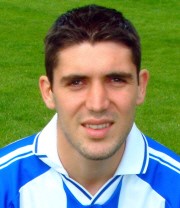
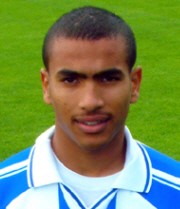
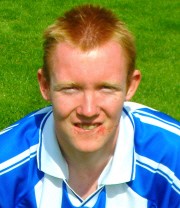
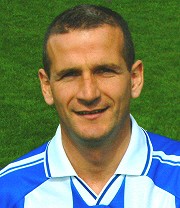
Stephen Carson, Bryce Moon and Kyle McVey started their Coleraine careers in 2004/05, while Pat McAllister celebrated his testimonial
Inconsistency dogged Coleraine throughout that season, with occasional great performances (a 4-1 win over Cliftonville at Solitude, 5-1 away wins at Larne and Loughgall and a 6-1 home win over Newry) being balanced by a few less than stellar showings ( heavy home and away defeats by Linfield, two defeats at the hands of Institute). Narrow quarter-final defeats in both cups represented further disappointment, while a league finish of sixth was the lowest of Quinn’s reign.
The Darkest Hour
Further reductions in the playing budget during the summer of 2005 saw McAllister, Tolan, Flynn, Haveron and Armstrong all leaving and replacements such as Institute trio Stuart Bratton, Paul McLaughlin and Tony Gray were hardly of a similar calibre. A number of players from the youth and reserve teams including Darren Boyce, Peter Spratt, Johnny Watt and Ciaran Ferry were also promoted to the first team squad.
But for a while it looked like this new look Coleraine would never even get an opportunity to take to the field in a competitive match. At the start of August it emerged that the club was over £1.3 million in debt and was facing a winding-up petition from the Inland Revenue.
On Tuesday August 9 2005, Coleraine hosted neighbours Portstewart in a friendly that looked like the last act of the Coleraine FC story. The final scoreline, a 2-0 victory, was immaterial as supporters feared for the club’s existence. Meanwhile, representatives of a supporters group, the Friends of Coleraine FC, were busy working behind the scenes to try and persuade the High Court to allow them time to prepare a business plan to prove the club could be viably run.
Happily, the club was granted a reprieve and were allowed to start the season the following Saturday. Their opponents, Glentoran, generously gave Coleraine the revenue from the ‘gate’, an outstanding gesture. Eventually, they were allowed to go into Administration and a Steering Committee was set up to oversee the running of Coleraine throughout the season.
Results on the pitch were mixed, but supporters were just happy that they still had a team to support and in September they did at least have a trophy to cheer, as Coleraine defeated Institute to win the North West Cup. Early knockouts in the CIS and Irish Cup were immaterial as Quinn concentrated fully on ensuring league survival, an objective which was eventually achieved with some ease with a ninth place finish.
Further good news arrived in the summer when the club came out of administration and the Friends of Coleraine were allowed to buy the club meaning the new season began with renewed optimism. New signings included Tommy McCallion, who returned for a third spell at the club, and English forward Damien Whitehead, both of whom would play an important part during the season.
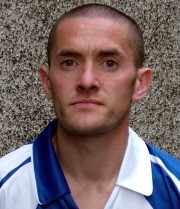
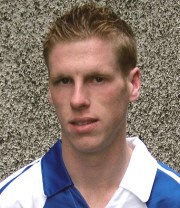
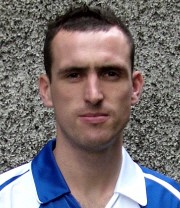

Home-grown players who played a big part in the 2006/07 season (L-R) Tommy McCallion, Darren Boyce, John Neill, Johnny Watt
Coleraine were unfortunate to miss out on qualification for the CIS Cup quarter finals, coming out on the losing side in high scoring encounters against Cliftonville and Dungannon Swifts in their group, but after a relatively promising start in the league, it turned into a miserable autumn.
Quinn offered to resign after one particularly poor showing against Glenavon and, although he was once again persuaded to reconsider, a run of defeats, including an embarrassing defeat by Tobermore United in the final of the North West Cup, meant morale was low as December began. But a magnificent comeback from 2-0 down to salvage a draw against Linfield helped kick-start a revival.
After a draw against Portadown, Coleraine won eight games in succession, including a 3-2 win over Ballymena on Boxing Day, a first derby victory for three long years. There was almost more drama off the pitch in January as Quinn nearly accepted the vacant Newry City job, before a last minute change of heart saw him commit his future to Coleraine. The season ended with Coleraine in seventh, progress at least on the previous campaign.
Quinn brought Jody Tolan back to Coleraine in the summer of 2007, talking the fan-favourite out of his premature retirement following an injury-riddled two years. However, Coleraine were abject in the CIS Cup, only picking up two points in their six games and started the league campaign with a 4-1 hammering at home by Distillery.
Although the North West Cup was won against Tobermore United and wins over Larne and Donegal Celtic lifted spirits, a run of one win in nine games left Coleraine in the lower reaches of the table. The 3-0 defeat by Cliftonville at the start of December saw Paul Gaston make his 600th and final appearance in a Coleraine shirt as he moved on to Limavady in January. Also moving in January was Darren Boyce, who was sold to Glentoran.
Meanwhile, Quinn worked the transfer market himself to try and revive his side’s flagging fortunes, bringing in defenders Paddy McLaughlin and Matt Crossan and forward Marty Hunter. The emergence of defender Howard Beverland in December had injected some youth into the line-up and promising winger Stephen Dooley made his debut before the end of January.



As Paul Gaston’s Coleraine career came to an end, Howard Beverland and Stephen Dooley were just starting theirs
But it was a more established star who helped lead the revival as February began. Newry v Coleraine had been picked as one of the first Irish League games to be shown live by Sky Sports under the IFA’s new television deal and on a rain-soaked night in Newry, Stephen Carson opened the scoring, before Marty Hunter added a second. Carson’s fine form continued with a winner against Limavady and his first Coleraine hat-trick in a 3-3 draw with Crusaders to help drag Coleraine up the table.
All the while, Coleraine were quietly making progress in the Irish Cup, beating Tobermore 1-0 in the fifth round before defeating Brantwood 6-1 in round six. The quarter-final pitched them into a North West derby with Institute and after a tight 0-0 draw at Drumahoe, Coleraine went to town on their opponents at home. After recovering from the shock of conceding an early goal, Coleraine tore their opponents apart, with Carson and fellow winger Darren Cassidy particularly impressive in their 5-1 victory. Goals from John Neill, Carson, Kyle McVey, Cassidy and Tolan booked Coleraine their spot in the semi-finals against Donegal Celtic.
Coleraine initially struggled in the Ballymena Showgrounds clash and fell behind just after the hour mark. Lots of pressure in the latter stages came to nothing until substitute Dooley picked the perfect time to grab his first Coleraine goal and earned a replay.
When the teams met again three days later, Coleraine went in front through Marty Hunter, but were pegged back by a goal from former Bannsider Sean Armstrong. The game moved on into extra time and penalties looked inevitable until, in the very last minute Hutchinson’s cross fell to Davy Patton and the veteran forward rifled the ball into the net to put Coleraine in the final.

Davy Patton and Stephen Carson celebrate Patton’s semi-final winner against Donegal Celtic
After the drama of that night, Coleraine travelled to Portadown and produced a performance and scoreline reminiscent of their last cup-winning season, winning 5-1. But the weeks leading up to their cup final showdown with Linfield were dogged by injuries and Coleraine weren’t quite at full strength when they took on the Blues on May 3.
That said, watching the first half, you couldn’t have told which team had won the league and which had just finished ninth as Coleraine tore into their opponents. Carson caused them constant problems and Coleraine deservedly led through Paddy McLaughlin’s 18th minute strike. It could have been more before the break as Carson was denied a penalty and Patton missed a good opportunity but within seven minutes of the restart, Coleraine were made to pay for those missed opportunities as Peter Thompson scored twice to win Linfield another league and cup double.
Disappointing though the outcome was, for Coleraine to even be in that position, having stared oblivion in the face only three years previously, was some achievement and hopes were high that Coleraine could now build towards a more positive future. However, Quinn would not be part of Coleraine’s future, surprisingly resigning less than a month after the final to take over as manager at newly-promoted Bangor.



